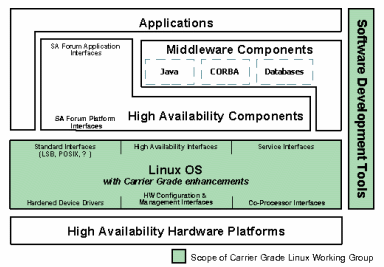Registration open for CGL 3.2
Mar 2, 2006 — by LinuxDevices Staff — from the LinuxDevices Archive — 1 views[Updated Mar. 3] — The first “registerable” release of the Carrier Grade Linux (CGL) 3 specification has been made. Linux distributions can now be registered as compliant with CGL 3.2, which includes a variety of changes based on feedback from specification users, according to the OSDL (Open Source Development Labs), the member-funded industry group that maintains the specification.
Compliance with the CGL specification is done by Linux vendors and distributors directly, rather than by a certification body. The process is described in this whitepaper.
The CGL v3.2 spec includes an 18-page overview document, along with seven PDF documents defining requirements for:
- Availability — Applies to the kernel, core libraries, and essential tools, with regard to single-system availability
- Serviceability — Defines tools and methods to manage, install, maintain, upgrade, and monitor
- Performance — Unique performance requirements of carrier-grade applications
- Clustering — Aimed at supporting clustered applications in a carrier-grade environment, as an effective way to achieve highly available services
- Standards — A reference for standards such as POSIX, IETF, and DMTF referred to in the CGL 3.2 functional requirements
- Hardware — Identifies important hardware building blocks, and the open source software needed to support it, as the industry migrates from proprietary platforms to COTS building blocks
- Security — Objectives and requirements aimed at analyzing and mitigating threats, and improving resiliency

OSDL's Carrier Grade Linux architecture
(Source: OSDL)
Carrier-Grade Linux working group initiative manager Ibrahim Haddad lists the following new features of CGL 3.2:
- Updates to Serviceability, Performance, Hardware, and Standards sections of the specs based on input from CGL members and input from carriers
- 3.1 was not registerable; 3.2 is a registerable release
- With 3.2, the first CGL 2.0 distribution just over a year after the release of CGL 2.0 requirements. Other Linux vendors that have registered CGL 2.0-compliant distributions include TimeSys, Novell/SuSE, MontaVista, FSMLabs, Wind River, and AsiaNux.
About 25 companies develop products based on CGL, the OSDL says, making it one of the most successful open source standards efforts ever, if not the most successful.
Availability
The CGL v3.2 spec was quietly released on Valentine's Day of this year. The registration process officially opened today, with the release of an 11-page document explaining the registration process. Additional details can be found here.
This article was originally published on LinuxDevices.com and has been donated to the open source community by QuinStreet Inc. Please visit LinuxToday.com for up-to-date news and articles about Linux and open source.